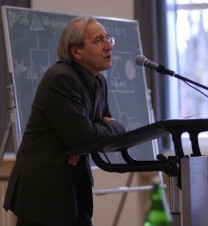Professor Dr. Karl-Heinz Kohl was born in 1948 in Fürth, where he spent his childhood and youth. Apart from having impressions of rural Germany when visiting his relatives, Kohl had an early interest in literature. After finishing school in 1968 he went to Erlangen and took up courses in several subjects, i.e. Anthropology, Science of Religion, Philosophy and History. He eventually moved to Berlin in 1970, where Fritz Kramer was among his teachers.
After his graduation in 1975 Kohl did his first field research on the island Flores in Indonesia. After his return he not only worked at the University in Utrecht for a year but also took up an assistant position at the Institute of Scientific Studies of Religion in Berlin. There he finished his PhD in 1980 and eventually organized the exhibition project Myths of the New World (1982) in Berlin at the Martin-Gropius-Bau.
In 1984 Kohl was interim chairman at the Department for Anthropology in Mainz. After further research in Indonesia, Kohl finished his habilitation thesis in 1986. From 1988 until 1996 he held a full professorship at the Department in Mainz and also was head chairman of the expert body of the German Research Foundation (Deutsche Forschungsgemeinschaft, DFG) from 1992 to 1996.
Since 1996 Kohl is director of the Frobenius-Institute in Frankfurt/Main and professor for cultural anthropology at the Institute for Ethnology (Johann-Wolfgang-Goethe-University, Frankfurt/Main). He also is the editor-in-chief of the anthropological journal Paideuma. In 2011/2002 Kohl was Theodor-Heuss-Professor at the New School for Social Research in New York. Since 2005 he is member of the Berlin-Brandenburg Academy of Sciences. Furthermore Kohl chaired the German Anthropological Association (Deutsche Gesellschaft für Völkerkunde, DGV) from 2007 - 2011.
While his research areas are Indonesia and Melanesia, Kohls theoretical interest mainly focusses on the history and theory of anthropology as well as on the anthropology of religion.




